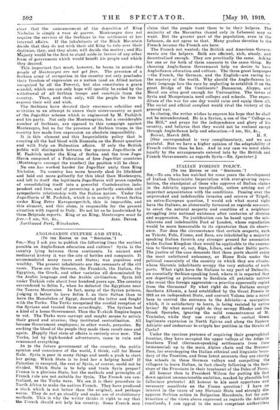ANGLO-SAXON CULTURE AND SYRIA.
[To THE EDITOR or THE " SPECTATOR:1 SIL.—May I ask you to publish the following lines the earliest possible on Anglo-Saxon education and culture? Syria is the country lying between three continents. In ancient and mediaeval history it was the site of battles and conquests. It accommodated ninny races and States; was populous and wealthy. The present inhabitants are the remnants of the old races. These are the German, the Frankish, the Italian, the Egyptian, the Greek, and other varieties all denominated by the Arabic language and the Arabic civilization. Syria fell under Turkish rule about four hundred years ago. The country surrendered to Selim I., when he defeated the Egyptians near the Taurus Mountains. In fact, many of the Syrian princes, judging it better to have Selim I. as their Sultan than to have the Mamelukes of Egypt, deserted the latter and fought with the Turks. The Turks recognized the cordial reception of the Syrians and treated them accordingly. The Syrians had a kind of a home Government. Then the Turkish Empire, began to rot. The Turks were corrupt and sought means to satisfy their greed and avarice; they instituted centralization. All became Government employees; in other words, parasites. By sticking the blood of the people they made them revolt once and again. Happily that state of affairs is entirely over now. The Turks, led by high-banded adventurers, came to ruin and renounced everything.
As to the future government of the country, the public opinion and conscience of the world, I think, call for Home Rule. Syria is poor in many things and needs a push to start her going. Which State is to lend her a helping hand? If Palestine is excepted, the rest of Syria, of course, could not be divided. Which State is to help and train Syria proper? France is a glorious State, but the methods and principles of French rule are not suitable for Syria. The French are cen- tralized, as the Turks were. We see it is their procedure in North Africa to make the natives French. They have produced a stock which is not better than the original, and perhaps worse. They do not go steadily and make use of evolutionary methods. This is why the writer thinks it right to say that the French should not help his country. Some French may claim that the people want them to be their helpers. The majority of the Maronites (found only in Lebanon) may so want. But the greater part of the population, even in the Lebanon, do not agree to that. Many profess devotion to the French because the French are here.
The French not wanted; the British and American Govern. meets are the helpers. Both are efficient, rich, steady, and decentralized enough. They are practically the same. Asking for one or for both of them amounts to the same thing. By choosing Anglo-Saxon Government help we desire to have Anglo-Saxon education and culture. The three great languages —the French, the German, and the English—are racing for the mastery of the world. Why should the Anglo-Saxons let their language lose the race by neglecting to establish it on the great Bridge of the Continents? Damascus, Aleppo, and Mosul are sites good enough for 'Universities. The towns of Syria and Mesopotamia need colleges and schools. The expel). diture of the war for one d7 would raise and equip them all. The social and ethical conquest would rival the victory of the general war.
In closing, the writer wishes to express his hope that he shall not be misunderstood. He is a Syrian, a son of the " College on the Hill," and prays for the independence and glory of his country, and believes that they would not be realized except through Anglo-Saxon help and education.—I am, Sir, &c., Beirut, March 28th. H. S. [Our correspondent is very complimentary, and we are grateful. But we have a higher opinion of the adaptability cf French culture than he has. And in any ease we must abide loyally by the arrangements entered into by the British and French Governments as regards Syria.—Eo. Spectator.]






































 Previous page
Previous page